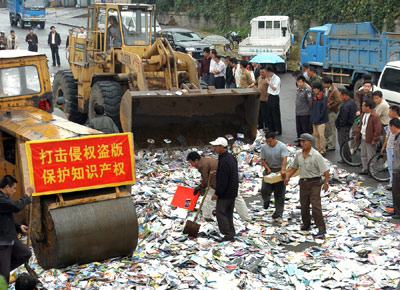Each crack-down campaign seems to be preceding some important event. The World Expo, APEC meeting, the Olympics, WTO conference, things like that. Is there ever a crack-down for its own sake?

What actually follows those crack-downs is either nothing or almost nothing. There are numerous DVD shops that have stayed in the same location for years, over ten years even. One or more for each kilometre of street.
Sometimes a shop here and there is temporarily closed for renovation or some other practical reason. Sometimes they seem all closed for a day or two for the very reason it was supposed to be closed down for good. But once the VIP withdraw the stage, the shops open as if nothing happened.
Except recently. Something actually happened. In the wake of the Shanghai World Expo 2010, most DVD shops actually had to do something concrete.
I guess there is a new regulation stating something like "only original DVDs and CDs can be sold in the patrons' area of a record store", or perhaps "only original products can be introduced in the customer areas", or something along those lines - leaving enough room for creative interpretations.
Apparently this new rule differs from the previous ones in that it is actually actually enforced. The Expo is open for some six months, so actually closing down the thousands of shops for half a year would cause a major outcry. This time the shops made the changes. They actually removed the pirated products from their customer premises.
Right. What the shops did is that the they changed their customer spaces to be much smaller. Many shops are now 1/3rd or even 10th of the size they used to be. Each one built a new wall. Most installed a temporary office wall, painted grey or covered with grey plastic or grey fabric. Most of the shops now look as if their back wall is unusually close to the front door. They're shorter than they're wide.

But there's also a new door. The grey walls are covered with posters or shelves full of genuine entertainment as an attempt to camouflage the door. The door leads to the rest of the shop, to what may now be called the storage area. The new back-store behind the grey wall is much larger than the front-store, and all the pirated goods are there in their shelves, in the same good order as always.

On the second thought, it is not a bad idea at all. Earlier it was a challenge to spot a genuine item, but now it's easy. Originals are in the front, region-freed in the back. All sales are still handled through the same cash register in the front.
Some shops hide the door behind a curtain or a movable shelf, but most don't see the trouble. Customers appearing to be dumbfounded in the shrunken shop are swiftly hurdled down the door to the back side. The new wall makes the rest of the shop much quieter, as the main door is almost always kept wide open to the busy street.

You may have seen press photos or news clips where a pile of DVDs are crushed with a road roller. Who knows if those piles of DVDs were already sold once and are now throwaways collected from the trash. Perhaps they are broken, returned by the customers. Or maybe those were batches found to have errors due to a problem in the factory, so they'd need to trash them anyway. Maybe those were the original versions, already copied, but illegally imported and now destroyed for this reason.
It's all about the appearances.
